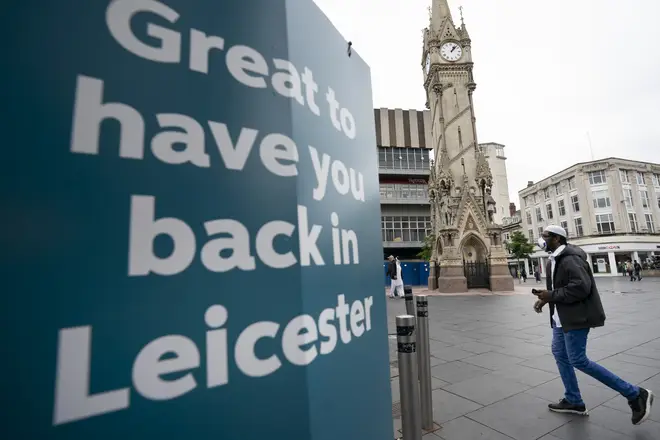
Ali Miraj 12pm - 3pm
2 July 2020, 07:01

The increase in Covid-19 cases which led to the Leicester local lockdown could have been caused by community transmission rather than a specific outbreak, according to a report.
The east Midlands city was ordered into a "local lockdown" by Health Secretary Matt Hancock with restrictions imposed after a spike in coronavirus cases in the area.
But a new report from Public Health England has found "no explanatory outbreaks in care homes, hospital settings, or industrial processes" in the city.
Read more: What is a local lockdown and how do they work?
The report from PHE found growth in the number of under 19s who had been infected in the city, an increase from 5 per cent of all cases in mid-May to 15 per cent in June.
There was a similar increase in infections among working-age people.
Read more: Government will change law to enforce local lockdown in Leicester

Why were the govt so slow to react to Leicester's Covid-19 outbreak?
"If an excess of infections has occurred then it is occurring in young and middle-aged people," the report said.
It added that there was no "analytical link" between the reopening of schools to more pupils in June and the increased infection rate, but that further investigation would be "sensible".
Read more: Coronavirus: Leicester local lockdown - what is closing down, why and where?
The report concluded the evidence for the scale of the outbreak was limited but added the proportion of positives from PCR testing - the national standard for identifying new coronavirus cases - is rising.
"This is suggestive of a genuine increase in numbers of new infections, not simply an artefact of increasing test rates," it said.
Read more: Sadiq Khan raises questions over local lockdown for London amid rise in cases in capital

Leicester mayor says they will need Government support during lockdown
The preliminary investigation report - released on Wednesday evening - suggested the infection rate in the city had fallen from 140.2 to 135.7 per 100,000 people in the from the week to June 20 to the seven days prior to June 27.
This is still significantly higher than the overall infection rate in England which fell over the same period from 10.7 to 6.7 per 100,000 - despite the easing of some lockdown restrictions.
Read more: Boris Johnson denies ‘11-day delay’ in bringing in Leicester local lockdown during clash at PMQs

Health Secretary Matt Hancock announces local lockdown in Leicester
Meanwhile, academics and clinicians from the University of Leicester said reimposing lockdown represents a "failure of timely intervention".
Prime Minister Boris Johnson denied there was any delay in imposing the local lockdown, when asked in the Commons by Labour leader Sir Keir Starmer.
But, in a letter to The Lancet medical journal, the group of academics and clinicians wrote that the spike of regional infections had exposed "key problems" that need to be "urgently addressed".
"In particular, the opportunity to escalate interventions locally has been stymied by the inadequacy of information sharing," the letter said.
But the letter's signatories report that news of the city's outbreak came as a surprise to local health organisations, who were only able to access "pillar 1" data at that time.

Boris Johnson denies "lost week" in responding Leicester spike
Pillar 1 data - tests carried out in NHS and PHE laboratories - found that the number of new cases per day was low throughout the first half of June, according to the authors.
The academics and clinicians wrote that information through pillar 2, testing of the wider community, indicated an ongoing spike but was "not communicated in a timely manner" to local authority and health organisations.
The correspondence raises concerns that an area-specific lockdown will "target and disproportionately affect ethnic minority communities", adding that adherence to any proposed measures requires effective community engagement.
"We should remain mindful that lockdown is a blunt and damaging tool of last resort that represents a failure of timely intervention," the letter stated.
"Our experience brings into sharp focus the shortfalls in the current identification and management of local Covid-19 outbreaks."
The letter, signed by seven academics and clinicians from the university, calls for a coordinated public health response that is "locally led, agile, and responsive to prevent unnecessary morbidity and mortality".